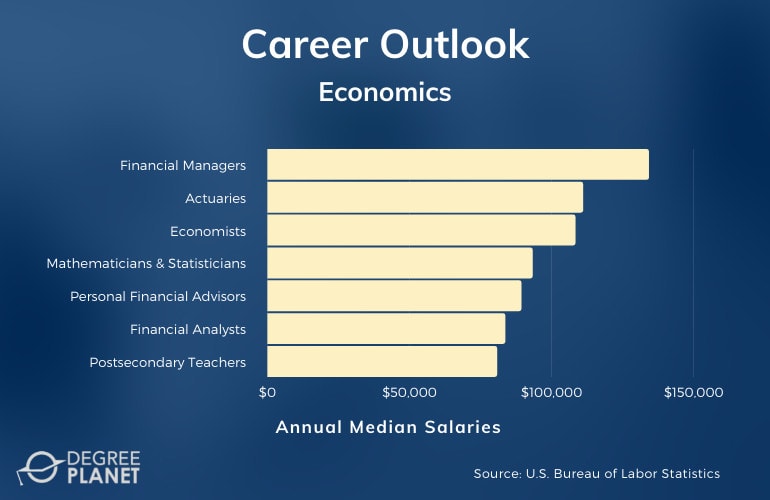Is a masters in economics worth it?

A graduate degree in economics can help you develop advanced skills in the fundamentals of economics and boost your knowledge of financial trends.
Editorial Listing ShortCode:
The career opportunities that students who graduate with a Master of Economics can pursue are immense. Economics plays a role in nearly every industry and walk of life.
Is a Masters in Economics Worth it?

Yes, a masters in economics is worth it for many students. Masters in economics programs can help you learn how to interpret financial trends and analyze financial data at an advanced level. This can help you become an invaluable member of a company.
This knowledge is needed to formulate economic solutions and provide crucial business advice. Economists are considered extremely valuable and worthwhile in many industries.
With job growth projected to grow 14% through the next ten years, according to The Bureau of Labor Statistics, job prospects for people graduating from economics masters programs are extensive.
Editorial Listing ShortCode:
Because the work of studying financial trends is applicable in nearly every industry, an M.A. in Economics can give you the opportunity to pursue work in many different careers.
In addition, individuals who graduate with a masters of economics usually find themselves in high-paying roles. It is often considered to be one of the best-paying postgraduate degrees. While employment is not guaranteed upon graduation, it is an in-demand degree for many employers.
How to Decide Whether a Master’s Degree in Economics Is Right for You

Perhaps you are someone who is motivated by gathering and analyzing data and studying historical and future trends to make financial forecasts. Perhaps you want a career where you can positively influence and provide solutions for business fiscal issues.
Maybe the idea of recommending solutions to economic problems excites you, or perhaps you wish to find a high-paying career where you can work hands-on with financial data.
There are many reasons for wanting to pursue masters programs in economics. Here a few reasons you might want to pursue a Master of Economics:
1. You have great analytical and critical-thinking skills.

Having extensive problem-solving skills and the ability to suggest solutions for complex issues are beneficial traits for those pursuing a masters degree in economics.
Having an analytical eye can help you review data carefully, spot and indicate patterns in the data, and use that information to predict future financial conclusions. Being quick on your feet and having a sharp attention to detail can also help you show your commitment to positively impacting the business within which you work.
2. You have excellent communication skills.

Not everyone has the mindset of an economics graduate. Being able to effectively and efficiently explain your findings to people who are not in your role is essential.
This means having exceptional written and oral communication skills can be quite beneficial. Economists often need to report their findings to businesses or clients. This information is sometimes even published for stakeholder or outsider insight in journals, newspapers, or other media.
3. You want to be a more competitive hire in the job market.
If there’s one thing that a graduate degree in economics can help with, it is to make you more competitive in the job market. Focusing your economic studies on a particular field of interest by taking a specialization in your masters program may help with this even more.
Editorial Listing ShortCode:
Masters in economics programs can expose you to many different mathematical concepts, theories, and research methods. These studies can help you become a quick-thinking and impactful economist, which can help make you more valuable to future employers.
5 Things You Can Do with a Master’s Degree in Economics

Economics is a part of many careers and industries. Because of this, you should have many opportunities to pursue careers in a field that interests you the most.
Here are a few roles you may pursue with a masters degree in economics:
1. Economist
Economists study data and predict future financial trends for the businesses and clients they work for. They also recommend solutions to fiscal challenges and present these solutions and suggestions to others.
2. Mathematician or Statistician

Mathematicians and statisticians often collect data that is required to solve specific problems within the industries they work in.
They may create surveys or design experiments to assist in collecting that data. They may also be asked to present their findings and propose potential solutions.
3. Survey Researcher
Survey researchers design and analyze data from surveys and use this information to formulate ways to improve future surveys collected.
They are also involved in creating surveys and using the responses to develop factual answers and solutions that can be applied to larger populations.
4. Budget Analyst

Budget analysts prepare budget reports and monitor company spending. This assists in present and future planning of spending budgets. In addition, they look at past fiscal reports to monitor and improve future figures.
5. Senior Financial Analyst
Senior financial analysts are responsible for businesses’ investment decisions. They analyze the past, present, and future trends that may affect their finances.
People in this role often work in banks, mortgage agencies, or government agencies and are focused on improving the financial growth of the companies they work for.
Master’s in Economics Degree Alternatives

Perhaps a masters of economics degree isn’t exactly what you are looking for, but the thought of working with financial data and impacting businesses with positive solutions excites you. If that is the case, here are a few alternatives you might consider.
- Master’s in Finance. A graduate degree in finance can help you pursue a specific career in finance upon graduation. It’s also a shorter degree option that usually takes just around 1 year to complete.
- Master’s in Business Administration. An MBA is an all-encompassing business graduate degree that focuses on practical theories and investment management. Many that are interested in general business management earn this degree.
- Master’s in Science of Economics. A MSc in Economics typically focusues on the scientific principles involved in the field of economics. A MS in economics usually takes a broader approach. There is usually a greater emphasis on research and theories in a Master of Science in Economics program.
These are just a few alternative options to a graduate degree in economics. Finding which is best for you depends on your long-term career goals and interests.
Economics Careers & Salaries

With most industries requiring someone to work in economics, there are many jobs that can be pursued after getting a masters in economics. It is a competitive industry, but The Bureau of Labor Statistics predicts a 14% growth of employment for economists through the next decade.
According to the Bureau of Labor Statistics, here are some potential careers you can pursue with a Master of Economics.
| Careers | Annual Median Salaries |
| Financial Managers | $134,180 |
| Actuaries | $111,030 |
| Economists | $108,350 |
| Mathematicians and Statisticians | $93,290 |
| Personal Financial Advisors | $89,330 |
| Financial Analysts | $83,660 |
| Postsecondary Teachers | $80,790 |
| Budget Analysts | $78,970 |
| Market Research Analysts | $65,810 |
| Survey Researchers | $59,870 |
These are just some of the careers you can pursue with a masters in economics. Some of the careers listed above may require additional licensure, education, or work experience to obtain.
What Do You Learn in Economics?
A masters in economics program can help you develop advanced analytical and problem-solving skills. It can help you learn how to make impactful decisions that positively affect the financial situations of the businesses you work for.
Editorial Listing ShortCode:
Economics programs typically teach how to design, collect, and analyze data research in a way that looks at the past, present, and future fiscal positions of companies and clients.
Here are a few courses you may encounter when enrolled in masters in economics programs.
- Microeconomic Theory
- Applied Econometrics
- Labor Economics
- Public Economics
- Financial Stability and Growth
- Advanced Mathematical Economics
These are just some of the courses that may be taken in a masters in economics program. Your curriculum will vary depending on the university you attend.
What Can You Do with a Masters in Economics?

There is so much you can do with a masters in economics because most industries require the assistance of people that are well-versed in this field. You may find yourself working full-time as an economist, a mathematician, a professor of economics in a postsecondary school, or a senior financial analyst.
The Bureau of Labor Statistics states that employment for economists is expected to be strong for workers with a Masters of Economics. They project a job growth of 14% for economists in the next ten years.
How Much Does a Masters in Economics Make?

Though a career is not guaranteed upon graduation, the salary outlook for those with a masters in economics is typically good.
According to the Center on Education and the Workforce (CEW), those with this degree usually make between $68,000 to $182,000 a year. The median income level is $109,000 a year.
It’s important to note, though, that the lower end of the pay scale is only within the 25th percentile of recorded employment. A masters in economics often leads to exceptionally well-paying careers.
What High Paying Jobs with a Masters Degree in Economics Can You Get?

According to the CEW, professionals employed in the field of economics holding a masters degree make a median salary of $109,000 annually. Some graduates see earnings up to $182,000 annually.
Although a masters degree in economics does not guarantee your employment upon graduation, this graduate program is definitely not worthless. Many students find getting this degree to be worthwhile.
Editorial Listing ShortCode:
Getting a masters degree in economics often leads to some of the highest paying positions in the field of economics and rewarding careers in a variety of industries as well. Many individuals with this degree report earnings of over $80,000 a year.
Some of these high-paying jobs include economists, senior financial managers, economics professors, and mathematicians.
What Does an Economist Do?

Economists collect and analyze data and research. They design and conduct surveys in order to evaluate economic issues that concern businesses and clients. They also look at the past, present, and future forecast data of organizations’ financial trends.
They use mathematical models and statistical techniques to advise businesses and give solutions to fiscal issues. Sometimes, the reports they create and share with their colleagues or shareholders are printed for journals, newspapers, and other media sources.
Which Is Better, MA in Economics or MBA?
The decision of whether an MA in economics is better than an MBA is dependent upon your personal career goals and interests. Both programs are applicable across a wide variety of industries, but they focus on different things.
Here a few ways that the two degrees differ from each other to help you decide which one you should pursue.
| MA in Economics | MBA |
|
|
Either of these degrees can help open doors to a variety of careers. The choice of which is better depends on what you want to focus on in your chosen industry.
What’s the Difference between a Graduate Certificate vs. Masters in Economics?
There are a few differences between a graduate certificate in economics and a masters in economics.
| Graduate Certificate in Economics | Masters in Economics |
|
|
There are some key benefits to pursuing a masters in economics over a graduate certificate, but which you should choose depends on your personal career goals.
Getting Your Masters in Economics Online

A masters in economics is often considered to be a highly desirable graduate degree. Getting this degree can potentially lead to high-paying opportunities in a wide variety of industries.
Although the coursework involved can often be intensive and research-heavy, the flexibility of online economics degrees can help you create a schedule adapted to your life and workload. The skills you can learn in this degree can help you become a valuable employee in many industries.
You can begin your journey by investigating which online masters in economics programs best suit your needs and can help you take the first steps to earning your masters in economics.

